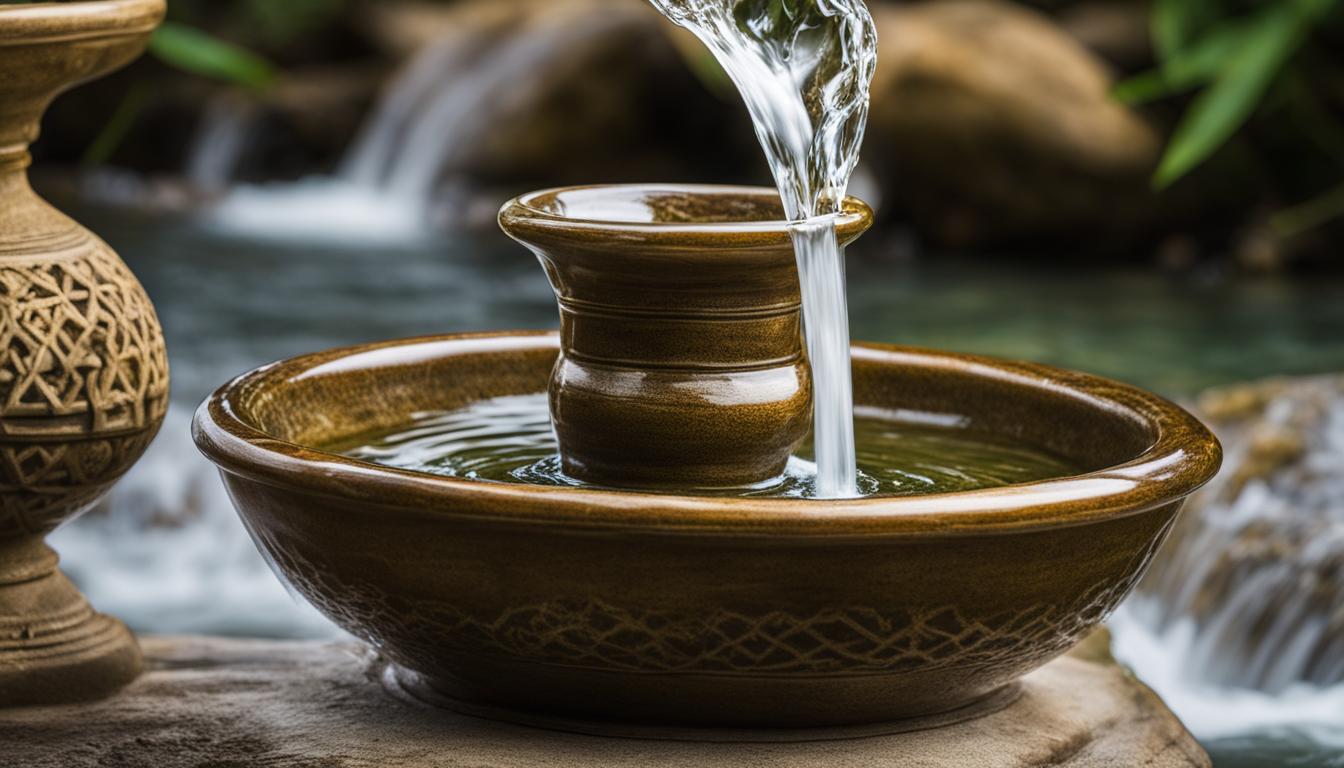Wudu, also known as ablution, holds great significance in Islam as a practice of purifying the body before prayer or reciting the Quran. It not only serves as a means of spiritual purity but also provides numerous health benefits. The act of performing wudu involves washing certain body parts, including the face, arms, mouth, nostrils, ears, and feet. This article will explore the multifaceted benefits of wudu, ranging from its impact on mental well-being to its role in maintaining physical hygiene.
Key Takeaways:
- Wudu is a practice of purifying the body before prayer or reciting the Quran in Islam.
- Performing wudu involves washing specific body parts to achieve spiritual purity.
- Wudu offers numerous health benefits, including improved oral hygiene and skin health.
- Regular wudu can bring mental peace and tranquility, strengthening one’s faith and connection with Allah.
- Cleanliness and purity are highly valued in Islam, with wudu being one of the prescribed purification rituals.
History of Wudu
Wudu, an Islamic purification ritual, has a rich history dating back centuries. This sacred practice plays a vital role in preparing Muslims for prayer and spiritual devotion. The procedure of wudu involves a series of specific acts of washing and wiping different body parts, symbolizing the purification of the soul and body.
From its origins in the teachings of Islam to its significance in the lives of Muslims today, the history of wudu is deeply intertwined with the religious beliefs and practices of the Islamic faith. Muslims are required to perform wudu before engaging in prayer or reciting the Quran, as it is believed to grant spiritual purity and enhance one’s connection with Allah.
Throughout the centuries, the wudu procedure has remained consistent, highlighting the importance of cleanliness and ritual purification in Islam. By washing the face, arms, wiping the head, and washing the feet, Muslims not only cleanse their physical bodies but also engage in a symbolic act of surrendering to the divine will.
The Benefits of Wudu For Body Health
Wudu, an essential practice in Islam, offers numerous health benefits that contribute to overall body health. From physical cleanliness to improved oral hygiene, wudu plays a vital role in maintaining the well-being of individuals.
When performing wudu, the act of washing the face, arms, and feet helps to cleanse the skin, removing not only dirt but also fatigue accumulated throughout the day. It effectively eliminates dust, sweat, and fats, leaving the skin refreshed and rejuvenated.
Moreover, wudu plays a significant role in maintaining good oral hygiene. By rinsing the mouth during wudu, individuals can effectively remove food particles that may lead to bad breath and dental problems. This simple act of oral cleanliness prevents the development of oral health issues and promotes healthier teeth and gums.
Additionally, the rinsing of the nostrils during wudu ensures that germs are not trapped, preventing them from entering the body. It acts as a preventive measure, reducing the risk of respiratory tract infections and other illnesses caused by airborne pathogens.
Washing between the toes and fingers is another important aspect of wudu. This act helps to remove hidden bacteria and dirt that may accumulate in these hard-to-reach areas. By thoroughly cleansing these body parts, individuals can minimize the risk of infections and promote overall hygiene.
Lastly, the pressure applied to certain points of the arms during wudu improves blood flow, enhancing circulation throughout the body. This increased blood flow contributes to physical and mental well-being, promoting improved vitality and overall health.
The Blessing & Reward of Wudu In Akhirah
Wudu holds a significant place in the afterlife, with various rewards and blessings associated with its performance. According to Islamic teachings, the one who performs wudu according to the sunnah will have their sins washed away, even from under their nails. Wudu is also seen as a means of recognition in the afterlife, with the Prophet Muhammad (SAW) recognizing his followers from the traces of wudu on their faces, hands, and feet. Additionally, saying the supplication after wudu is believed to open the gates of Jannah (Paradise).

Acts of Performing Wudu (Ablution)
Performing wudu, or ablution, is an essential practice for Muslims, and it involves a specific series of acts. To ensure the proper performance of wudu, it is important to follow these steps in order:
- Niyaat: Begin by making the intention or niyaat in your heart to perform wudu as an act of worship and purification.
- Bismillah: Recite Bismillah, meaning “In the name of Allah,” before starting the process.
- Washing the hands: Begin by washing both hands up to the wrists, ensuring that water reaches between the fingers.
- Rinsing the mouth and nostrils: Take water into your mouth and rinse it three times, then use water to cleanse the nostrils by inhaling and expelling it.
- Washing the face: Wash your face three times, from the hairline to the chin and from ear to ear, making sure to include the beard (if applicable) and reaching the roots of the hair.
- Washing the arms: Start with the right arm, washing from the fingertips up to the elbow, and then repeat the same process for the left arm separately.
- Wiping the head: Take a wet hand and wipe over the entire head, starting from the front and moving to the back. Ensure that the ears are also wiped during this step.
- Washing the feet: Finally, wash both feet, starting with the right foot, and cleanse them up to the ankles, ensuring that water reaches between the toes.
By following these acts of wudu, Muslims can achieve the state of physical and spiritual purity required for prayer and other acts of worship.

Benefits of Wudu (Ablution)
Performing wudu holds numerous benefits for individuals. It not only ensures physical cleanliness but also contributes to spiritual purification.
Wudu eliminates impurities, both physical and spiritual, and is believed to remove sins. The act of washing specific body parts during wudu helps to cleanse the skin, remove dirt and sweat, and maintain physical purity.
From a health perspective, wudu plays a crucial role in disease prevention. By washing the hands, face, and feet, wudu helps to remove germs and bacteria that can cause illness. This practice of maintaining cleanliness through wudu promotes good hygiene and overall well-being.
Furthermore, wudu brings mental peace and tranquility. It is an opportunity for Muslims to pause, reflect, and connect with Allah. The process of performing wudu can be meditative, allowing individuals to clear their minds and find inner calmness. This spiritual aspect of wudu contributes to mental well-being and strengthens one’s faith and connection with Allah.
The Importance of Cleanliness in Islam
Islam places great importance on cleanliness and purity. The Quran and Hadith contain numerous references to the significance of cleanliness in Islam. Wudu, which is a purification ritual, is one of the practices emphasized in Islam that highlights the importance of maintaining cleanliness in all aspects of life.
Cleanliness serves as a means of achieving physical, mental, and spiritual well-being in Islam. It is seen as a way to cleanse the body, mind, and soul, ensuring that individuals are in a state of purity. By practicing cleanliness, Muslims aim to please Allah and gain His favor and blessings.
In addition to wudu, Islam encourages cleanliness in various forms. This includes maintaining personal hygiene, cleanliness of one’s living environment, and cleanliness when consuming food and water. It is believed that cleanliness promotes good health, prevents diseases, and fosters a sense of discipline and self-respect.
The Quran and Hadith provide guidance and instructions on cleanliness, outlining specific rituals and practices. For example, the Quran states, “Verily, Allah loves those who turn to Him constantly and He loves those who keep themselves pure and clean” (Surah Al-Baqarah, 2:222). This verse emphasizes the significance of cleanliness in Islam and the love Allah has for those who prioritize cleanliness.
Purification Rituals in Islam
Islam prescribes various purification rituals that uphold the importance of cleanliness. Besides wudu, Muslims are also required to perform ghusl (ritual bath) after specific circumstances, such as experiencing major impurity due to sexual intercourse, menstruation, or post-natal bleeding.
Furthermore, Islam promotes cleanliness in other aspects of daily life. Muslims are encouraged to keep their homes and surroundings clean, as it contributes to a positive and hygienic environment. Similarly, cleanliness in matters pertaining to food and eating establishments is emphasized to ensure the consumption of safe and wholesome meals.
Overall, cleanliness is considered a fundamental aspect of Islamic teachings, promoting physical well-being, mental clarity, and spiritual purity. By practicing cleanliness, Muslims strive to align with the values and teachings of Islam, striving for a balanced and holistic way of life.
Conclusion
Wudu, the Islamic practice of ablution, holds great significance for both spiritual and physical well-being. It serves as a means of purifying the body and soul, allowing Muslims to establish a deep connection with Allah during prayer. Through the acts of washing and wiping specific body parts, wudu offers a range of health benefits as well.
One of the key advantages of wudu is its impact on oral hygiene. By rinsing the mouth and removing food particles, wudu helps prevent dental issues and ensures fresh breath. Additionally, the act of washing the face, arms, and feet cleanses the skin, removes fatigue, and promotes overall physical cleanliness.
Moreover, wudu plays a crucial role in disease prevention. The ritual of washing certain body parts helps eliminate germs, bacteria, and dirt, reducing the risk of infections and illnesses. By maintaining regular wudu, individuals can enhance their immune system and protect their health.
Beyond the physical aspects, wudu also brings about a sense of mental and spiritual peace. The act of purifying oneself before prayer brings a state of tranquility and mindfulness, helping Muslims enter into a focused and serene state of worship. It strengthens the bond with Allah and deepens one’s faith.
By embracing the practice of wudu in their daily lives, Muslims can experience the holistic benefits it offers. From the spiritual purity to the physical well-being, wudu serves as a transformative and essential ritual in Islamic tradition.
FAQ
What is wudu?
Wudu, also known as ablution, is an Islamic practice of purifying the body before prayer or reciting the Quran.
How is wudu performed?
Wudu involves washing the face, arms, mouth, nostrils, ears, and feet in a specific order.
What are the benefits of wudu for body health?
Wudu helps cleanse the skin, remove fatigue, eliminate dust and sweat, maintain oral hygiene, prevent oral health issues, protect from germs, remove hidden bacteria, and improve blood flow.
What blessings and rewards are associated with wudu in the afterlife?
The one who performs wudu according to the sunnah will have their sins washed away, wudu is a means of recognition in the afterlife, and saying the supplication after wudu is believed to open the gates of Jannah (Paradise).
What are the steps of performing wudu?
The steps of performing wudu include making the intention or niyaat, reciting Bismillah, washing the hands, rinsing the mouth and nostrils, washing the face, washing the right and left arms separately, wiping the head and ears, and washing the feet.
What are the benefits of wudu?
Wudu ensures physical cleanliness, contributes to spiritual purification, removes impurities, removes sins, prevents diseases by washing away germs and bacteria, and brings mental peace and tranquility.
Why is cleanliness important in Islam?
Cleanliness is emphasized in Islam as a means of achieving physical, mental, and spiritual well-being, and gaining the favor and blessings of Allah.
What are the spiritual and health advantages of wudu?
Wudu allows Muslims to establish a connection with Allah during prayer and offers health benefits such as improved dental and skin health, disease prevention, and mental well-being.

